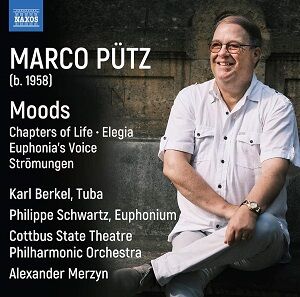
Marco Pütz (b. 1958)
Moods (2013)
Chapters of Life (2010)Elegia (2009, rev. 2021)
Euphonia’s Voice (2019)Strömungen (2014)
Karl Berkel (tuba), Philippe Schwartz (euphonium)
Cottbus State Theatre Philharmonic Orchestra/Alexander Merzyn
rec 2021, Stadtstheater Cottbus, Germany
Naxos 8.579116 [69]
Marco Pütz’s orchestral work Moods that gives this release its collective title had been recorded (review) as part of a first programme of Luxembourg Contemporary Music. The piece is dedicated to the memory of the composer’s father-in-law who had died earlier in 2013. Solistes Européens, Luxembourg who commissioned it stipulated that percussion be limited to timpani. The composer says: “The piece is built entirely using the same two intervals – tritone and major seventh, plus embellished stratified chords which end in modal clusters.” The title makes it clear that the music shifts between various atmospheres eventually ending in peaceful recollection.
The genesis of Chapters of Life goes back to 2009 when Pütz met the American tuba player Timothy Northcut, who asked if Pütz would like to compose a concerto for him. The only request was that the piece include a slow movement in memory of Northcut’s late brother Dana, a trombonist in the same orchestra, who died at the age of 50 (and a solo for alto flute, Dana’s wife instrument). Chapters of Life is a concerto in three movements laid out in the traditional pattern. Wild Days is a lively, boisterous Allegro ending with a brilliant cadenza before the coda. There follows the heart of the concerto, the beautiful and deeply felt Midlife (to Dana); the trombone and alto flute briefly dialogue in simple but quite moving terms. All sadness is brushed away in A Celebration of Life. The composer again notes that the movement represents the joy that can be found in life, despite all the strokes of fate that can befall a person. This is a very fine, emotional work, which deserves and repays repeated hearing. The back cover tells us that Chapters of Life is played here in the version for trombone and orchestra, without any further details. A quick check on the composer’s website confirms: there is a version for orchestra and another for wind orchestra.
The shorter Elegia is dedicated to the memory of the composer’s brother-in-law who died of an incurable illness at only 50. The piece is based on the theme of a Bach chorale from St Matthew Passion, O Haupt voll Blut und Wunden BWV 244/54. The main theme is quoted once in the course of the piece, played by the oboe. It is then heard in various permutations. For all its concision, this work, too, is a moving and sincere elegy.
As may be easily guessed from the title, Euphonia’s Voice is for euphonium and orchestra. It was commissioned by the Luxembourg Philharmonic Orchestra and the Philharmonie Luxembourg, who wanted to create a series of solo works written for lesser-known instruments. Pütz had various reasons to write a concerto for euphonium, among them his long-standing relationship with the Luxembourg euphonium player Philippe Schwartz, who performs the solo part in this recording. This is another work structured along traditional lines, although the three movements are played without a break. The Intrada ends with a cadenza over a pedal note of the double basses and leads into the central Cantilena. This is built around a fairly simple theme passed to various instruments over layered string chords and some tuned percussion; it is one of the finest things that I have ever heard. It leads into the Dance, in which the soloist has many opportunities for technical and musical display. Euphonia’s Voice is a very fine work that should be eagerly seized by any euphonium player who wants to enlarge their repertoire. I for one hope that this beautiful piece will become popular.
Strömungen was commissioned by the Luxembourg Ministry of Culture for the orchestra Solistes Européens, Luxembourg. The authors writes: “The title Strömungen has two meanings, both of which are expressed in my composition: 1. the movement, the flow of music, the urge to move forward, and 2. the different stylistic tendencies that are united in the piece.” A few basic elements govern the flow of the music throughout the piece. The introductory music builds up to a first climax which launches a more agitated section briefly cut short. The music then moves towards its greatest climax but – once again – this is briefly suspended. Later on, the introductory music returns, but played this time by a solo flute and piccolo over layered chords. From then on the music unfolds into a peaceful conclusion.
While clearly of its time, Marco Pütz’s music, fairly straightforward, is likely to appeal both to professionals and amateurs. One of his comments about Moods might apply to his music-making in general : “My main purpose is to make the music accessible to both musicians and the audience.” And so it does, wholeheartedly. This honest, sincere and strongly expressive music is well served here by soloists and orchestra, who all appear to relish what it has to offer.
In short, this is a very fine and enjoyable release with just one slight caveat. The recording is somewhat “straight in your face”, perhaps due to the acoustics of the Stadtstheater Cottbus. But this should not deter anyone with some liking for the music of, say, Edward Gregson from exploring this very fine and attractive disc.
Hubert Culot
Help us financially by purchasing from





















